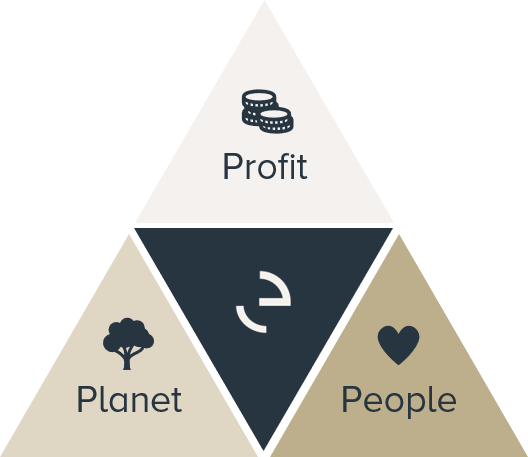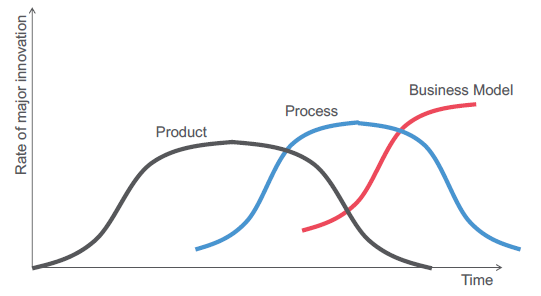Business models of the future are sustainable. In a company, this includes the environment, people and profit (see figure below). Sustainability in the company is no longer something that only ISO auditors have to account for. It is a very important part of the company brand. Employees, customers, partners, investors and other stakeholders are addressed and attracted by it, or not. We have already discussed in separate blog posts sustainable and social business models. In this article, of course, we want to know which characteristics business models must have in principle in order to be both resource-saving and socially just, and at the same time profitable. This is the triple bottom line: profit, planet and people. These are business models that promote cooperation within and outside the company, the exchange of goods, services and information, and they are always companies that take responsibility for their actions and promote appropriate behaviour. We will also look at examples of some companies that exemplify this approach.

Inhaltsverzeichnis
When is the time for business model innovation?
Sustainability can basically start at many different points in the company. In terms of the order of optimisation, established companies can be well guided by the general sequence of innovation in the figure below: First, sustainable or social products and services are often the focus of efforts, as these are particularly perceived by customers and are usually the most important part of the value proposition. After that, the focus can be directed to processes for creation and consumption or use. It is particularly important here that not only the impacts within the company (primary functions for the production of goods and services as well as support functions) are considered, but especially also outside the company and during the entire life cycle of the product at the customer.
The more comprehensively one lives sustainability in the company, the greater the impact on the company’s operations. Especially in new companies or when new processes or business models are implemented anyway, all three aspects of the triple bottom line should be taken into account. This saves a lot of effort later on.

Business models of the future: The important features
So what characteristics must sustainable business models have? For me, there are 3 pillars that make up sustainable business models:
Collaboration between stakeholders and outside the company. Collaboration fundamentally enables better and more appropriate solutions. This has an impact on all three areas of the triple bottom line. It can take many different forms: with clients in the planning or implementation of services. It can also be open business models that involve parties outside the own company to solve problems (outside-in) or to offer own (unused) resources in another context outside the own company (inside-out). Examples are Fujifilm’s IP use in the cosmetics industry; Procter & Gamble or Microsoft’s open innovation culture (Alex Osterwalder, Pigneur, Etiemble, & Smith, 2020; Alexander Osterwalder & Pigneur, 2010).
Sharing goods, services or information: Sustainability is often about efficiency in the use of resources. This is achieved, among other things, by sharing services. In mobility, there are countless examples of companies that build on this. Sharing services also makes it possible to reach more users through various mechanisms, because the costs are usually lower than owning something or using it alone. Here, too, both social and resource sustainability is influenced. In a broader sense, information sharing also belongs to this category. It makes it possible to get the most appropriate services and reduce waste. I also include in this category all platforms that connect different interest groups and promote the exchange of information or suitable services.
In the end, it is about having a clear vision of one’s business, taking responsibility and encouraging, rewarding or encouraging certain behaviour. This is often linked to financial incentives or the pricing of the offer.
Examples of sustainable business models from different industries
There are a large number of companies that take this responsibility for both the planet and society. One example is the cosmetics company Lush (Lush philosophy), which is committed to high-quality ingredients, against animal testing and for happy employees. The company has also taken various measures to reduce social inequality and discrimination against people of colour in the company. The company’s low-cost products and profit are only listed in the last places of its mission.
A very exemplary example for me: shoe manufacturer Timberland is comprehensively committed to social and ecological well-being (Timberland Responsibility). Besides reducing inequality in the company, I found an exciting initiative that all full-time employees are given 40 paid hours per year for social work. Such approaches, in my opinion, bring a benefit for all involved that goes far beyond the work done, in that responsibility is lived and perceived. Their vision is: to give more back to nature than we take from it.
All the examples mentioned above take their responsibility especially in the area of product and/or process of production and consumption. They care about society and the environment both within their own company and are also involved in organisations outside. But there are also companies that consistently gear their entire business model to sustainability. Probably the best-known recent example is the Danish energy producer Orsted. The company is in the process of converting its entire business model from fossil fuels to renewable energies. They are now using their existing off-shore knowledge to build off-shore wind turbines. Orsted was also named the most sustainable company of 2020 by Forbes. The list also contains many other exciting examples.
If you want to emphasise the social component in the business model even more, then this article will interest you. More on the topic of environmental sustainability and the example of Patagonia can be found in this article.
Conclusion: Shaping business models of the future
Economy and ecology have long ceased to be either-or decisions, as Bertrand Piccard’s initiative beyond 1000 solutions shows. Ecology can drive profit, be at the core of business models or even be a corporate purpose. And not only by non-profit organisations, but by for-profit companies.
Triple Bottom Line means that besides economic success, sustainability and social justice must also be important components of economic activity. All aspects are important pillars of the company brand and thus relevant for all stakeholders. Many companies focus their efforts on product and process innovations to become more sustainable and socially just. There are also companies that are aligning their entire business model with this. The potential is there.
If you want to make your business even more sustainable, start with an analysis of the current business model and the current processes and products. Depending on the focus, different assessment methods are suitable. This will give you an overview of the current situation and the greatest potential for optimisation. This is an important starting point for any change. evores supports you in designing a sustainable business model or sustainable products and services. As an environmental engineer, I can competently accompany you in many topics of sustainability and efficiency. Let’s co-create a sustainable future.
What topics are you interested in or what would you like another blog post about? Share your experiences and wishes in the comments. I will be happy to respond to them.
Further information on the business models
Book Invincible Company: Osterwalder, Alex, Pigneur, Y., Etiemble, F., & Smith, A. (2020). The Invincible Company. Strategyzer.com.
Book Business Model Generation: Osterwalder, Alexander, & Pigneur, Y. (2010). Business Model Generation. Self Published. https://doi.org/10.1523/JNEUROSCI.0307-10.2010
New contributions on the topic can be found on the economiesuissewebsite.
On the author

Claudio Lehmann is founder and consultant at evores. As an engineer and management consultant, he is fully committed to making the existing potential in companies visible and utilising it. Long-term sustainability starts with motivated employees and goes through efficient collaboration to the innovative strategy of companies that bring value to society. People. Planet. Profit.
Get in contact with me!
Article keywords